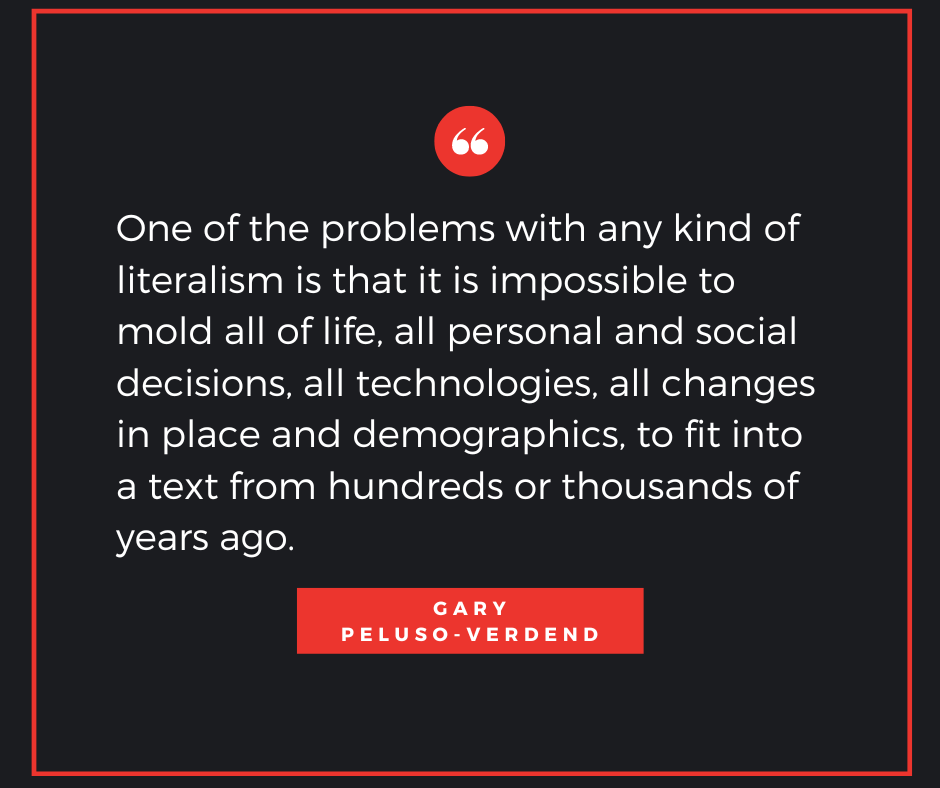One Cannot Open the Future with the Past’s Blood-rusted Key
“The sabbath was made for humankind, not humankind for the sabbath.” (Mark 2:27)
Does this order also apply to texts? Are texts made for people and not people for texts?
This is, obviously for any one paying attention to national debates, a live question.
So-called “literal” approaches to texts claim the authority of some past persons or generation, the wisdom and authority of a person or persons in this generation to interpret, and seek to limit contemporary life to what today’s authoritative persons claim is the way the first generation’s authoritative persons deigned life to be.
Note how this claim depends upon the recognized authority of a previous generation, of one or more persons in this generation recognized as authorities, a text which meaning can be definitively known today, and a people’s willingness to limit life to the boundaries the authorities set.
What about prejudices and inconsistencies in those authoritative human beings? The only ways around the dilemma of inconsistency are either to claim the authoritative generation was infallible, that any contemporary claim they were prejudiced or mistaken is wrong. Neither the authoritative writing generation or the authoritative contemporary interpreters have prejudices or inconsistencies.
Or, one must confess one is no longer an originalist or literalist but is interpreting the text in light of contemporary judgments. And, if one decides the writing generation or contemporary interpreters have any prejudices or inconsistent judgments, has not that interpreter departed from a literal, “originalist” reading?
Of course.
One of the problems with any kind of literalism is that it is impossible to mold all of life, all personal and social decisions, all technologies, all changes in place and demographics, to fit into a text from hundreds or thousands of years ago.
Regarding the Second Amendment to the Constitution: is a semi-automatic gun held by possibly untrained and undisciplined individual citizen included in the “well-regulated militia” and “the right to bear arms shall not be infringed” clauses? (And consider that “bear arms” was a term used only in military contexts.)
 In a document such as the Constitution, when does “men” mean the male of the species and when does it mean “human beings” inclusively? A literal interpretation, combined with known concerns such as Abigail Adams importuning John to “remember the ladies,” tilts in the male exclusive direction.
In a document such as the Constitution, when does “men” mean the male of the species and when does it mean “human beings” inclusively? A literal interpretation, combined with known concerns such as Abigail Adams importuning John to “remember the ladies,” tilts in the male exclusive direction.
When human behavior has clogged rivers and oceans with plastic in just 50 years and is driving ecosystems to make life for humankind inhospitable, and during an era where Congress is unable or unwilling to deliberate regarding many life-and-death matters, is it SCOTUS’s job to protect a pre-modern understanding of the Constitution while the nation burns, chokes, and floods?
When one claims to be a biblical literalist, believing in the “plenary inspiration” of the Bible, as if God dictated the words directly into the ears of the writers who were merely stenographers, it is well to ask what kind of literalist one is. On one extreme would be R.J. Rushdoony, one of the fathers of modern dominionism and theonomy. He believed disobedient children who persisted in their disobedience should be stoned, just as Deuteronomy 21: 18-21 commands. In today’s culture wars, one hears similar interpretations regarding homosexuals.
Most literalists don’t go that far. So, are they still literalists?
There are also self-identified literalists who claim Christ divided between the “ceremonial” expressions of his religion and the “moral,” and holds his followers only to the latter. That’s an interesting claim considering that distinction is not an ancient one and would seem to conflict with every “jot and tittle” in effect until heaven and earth cease to be.
Where are the literalists regarding keeping prayer in closets and off public display, or that list of virtues against which there is no law, or welcoming the sojourner, or that the rich have woes coming, or concerning the man who selfishly shared his windfall with no one and then died.
Communities create authoritative texts. When they do so, those communities make the decision to dance with those texts, to play with those texts, and—yes—to live with those texts in ways that DO shape it life.
Shape is not the same as mold.
Some of you will know the second stanza below as from a hymn. That hymn contains stanzas from a long poem by abolitionist James Russell Lowell. He wrote “The Present Crisis,” regarding the nation, its claims to truth, and slavery. Read the conclusion of his poem (emphasis mine):
They have rights who dare maintain them; we are traitors to our sires,
Smothering in their holy ashes Freedom’s new-lit altar-fires;
Shall we make their creed our jailer? Shall we, in our haste to slay,
From the tombs of the old prophets steal the funeral lamps away
To light up the martyr-fagots round the prophets of to-day?New occasions teach new duties; Time makes ancient good uncouth;
They must upward still, and onward, who would keep abreast of Truth;
Lo, before us gleam her camp-fires! we ourselves must Pilgrims be,
Launch our Mayflower, and steer boldly through the desperate winter sea,
Nor attempt the Future’s portal with the Past’s blood-rusted key.
Dr. Gary Peluso-Verdend is president emeritus at Phillips Theological Seminary and is the executive director of the seminary’s Center for Religion in Public Life. The opinions expressed in this blog are those of the author. Learn more about the Center’s work here and about Gary here.


Comments are closed.